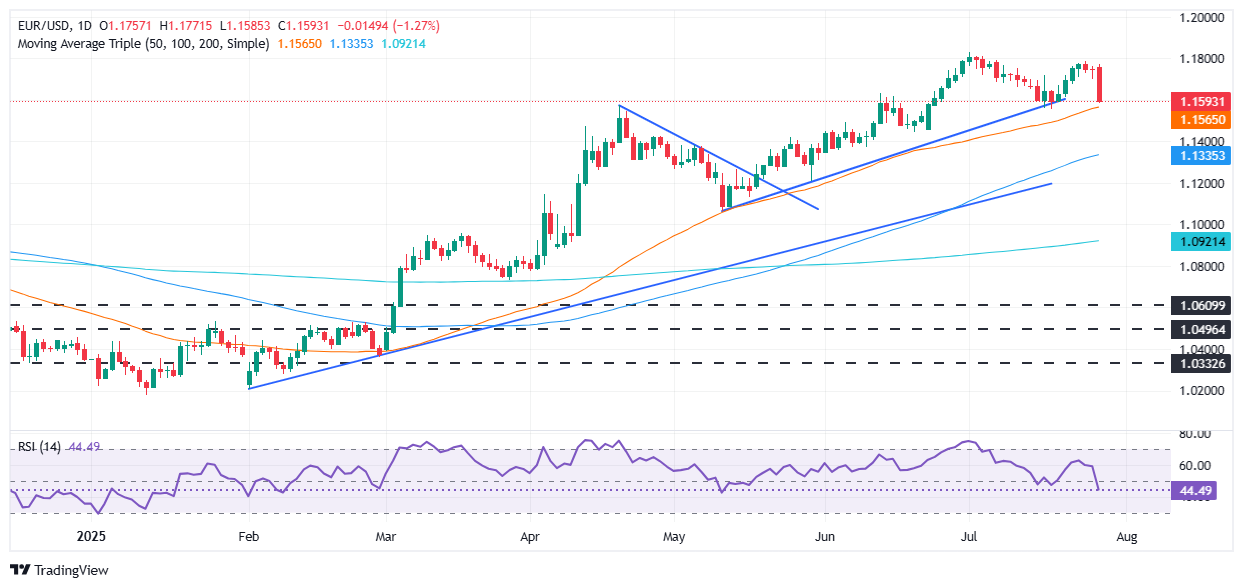Created
: 2025.07.29














![]() 2025.07.29 08:19
2025.07.29 08:19
The EUR/USD dropped more than 1% on Monday as investors bought the Dollar on news that the United States (US) and the European Union (EU) had reached a trade agreement, similar to the one inked by Japan. The pair trades at 1.1590 after reaching a high of 1.1771.
Wall Street ended Monday's session with gains as investors seemed confident that the US would reach additional deals throughout the week. Nevertheless, the August 1 deadline approaches, and Washington remains unable to reach agreements so far with two of its three largest partners: Canada and Mexico.
Aside from this, the US economic docket would be packed in the current week. The Federal Open Market Committee (FOMC) is expected to keep interest rates unchanged at its meeting on July 29-30. Eyes will be on the Fed Chair Jerome Powell as market participants look for cues on when the central bank will resume its easing cycle.
Besides this, further US economic data is awaited. The release of the Fed's preferred inflation gauge, the Core PCE Price Index for June, along with jobs and growth data, and the ISM Manufacturing PMI, is expected to provide insight into the current state of the economy.
Across the pond, the European Central Bank (ECB) held rates and adopted a meeting-by-meeting approach amid a split division between doves and hawks in the Governing Council.
The EU economic docket will feature Retail Sales data for Germany, growth figures for Spain, Italy, Germany and the EU. Furthermore, traders await the release of HCOB Manufacturing PMIs for Spain, Italy, Germany, and the bloc, jobs data, and inflation figures in Germany, and the EU.
EUR/USD plummeted below the 20-day Simple Moving Average (SMA) at 1.1693 and also below the 1.1600 figure, following the EU-US trade news. The Relative Strength Index (RSI) turned bearish, indicating that traders are booking profits on the pair and/or shifting slightly bullish on the Dollar.
If EUR/USD tumbles below the 50-day SMA of 1.1569, traders would expect a test of 1.1500. Once surpassed, the next stop would be the 1.1400 mark. On the other hand, if the pair climbs above 1.1600, the 20-day SMA would be up for grabs at 1.1693.

The Euro is the currency for the 19 European Union countries that belong to the Eurozone. It is the second most heavily traded currency in the world behind the US Dollar. In 2022, it accounted for 31% of all foreign exchange transactions, with an average daily turnover of over $2.2 trillion a day. EUR/USD is the most heavily traded currency pair in the world, accounting for an estimated 30% off all transactions, followed by EUR/JPY (4%), EUR/GBP (3%) and EUR/AUD (2%).
The European Central Bank (ECB) in Frankfurt, Germany, is the reserve bank for the Eurozone. The ECB sets interest rates and manages monetary policy. The ECB's primary mandate is to maintain price stability, which means either controlling inflation or stimulating growth. Its primary tool is the raising or lowering of interest rates. Relatively high interest rates - or the expectation of higher rates - will usually benefit the Euro and vice versa. The ECB Governing Council makes monetary policy decisions at meetings held eight times a year. Decisions are made by heads of the Eurozone national banks and six permanent members, including the President of the ECB, Christine Lagarde.
Eurozone inflation data, measured by the Harmonized Index of Consumer Prices (HICP), is an important econometric for the Euro. If inflation rises more than expected, especially if above the ECB's 2% target, it obliges the ECB to raise interest rates to bring it back under control. Relatively high interest rates compared to its counterparts will usually benefit the Euro, as it makes the region more attractive as a place for global investors to park their money.
Data releases gauge the health of the economy and can impact on the Euro. Indicators such as GDP, Manufacturing and Services PMIs, employment, and consumer sentiment surveys can all influence the direction of the single currency. A strong economy is good for the Euro. Not only does it attract more foreign investment but it may encourage the ECB to put up interest rates, which will directly strengthen the Euro. Otherwise, if economic data is weak, the Euro is likely to fall. Economic data for the four largest economies in the euro area (Germany, France, Italy and Spain) are especially significant, as they account for 75% of the Eurozone's economy.
Another significant data release for the Euro is the Trade Balance. This indicator measures the difference between what a country earns from its exports and what it spends on imports over a given period. If a country produces highly sought after exports then its currency will gain in value purely from the extra demand created from foreign buyers seeking to purchase these goods. Therefore, a positive net Trade Balance strengthens a currency and vice versa for a negative balance.
![]()
Created
: 2025.07.29
![]()
Last updated
: 2025.07.29

FXStreet is a forex information website, delivering market analysis and news articles 24/7.
It features a number of articles contributed by well-known analysts, in addition to the ones by its editorial team.
Founded in 2000 by Francesc Riverola, a Spanish economist, it has grown to become a world-renowned information website.
We hope you find this article useful. Any comments or suggestions will be greatly appreciated.
We are also looking for writers with extensive experience in forex and crypto to join us.
please contact us at [email protected].
Disclaimer:
All information and content provided on this website is provided for informational purposes only and is not intended to solicit any investment. Although all efforts are made in order to ensure that the information is correct, no guarantee is provided for the accuracy of any content on this website. Any decision made shall be the responsibility of the investor and Myforex does not take any responsibility whatsoever regarding the use of any information provided herein.
The content provided on this website belongs to Myforex and, where stated, the relevant licensors. All rights are reserved by Myforex and the relevant licensors, and no content of this website, whether in full or in part, shall be copied or displayed elsewhere without the explicit written permission of the relevant copyright holder. If you wish to use any part of the content provided on this website, please ensure that you contact Myforex.
Myforex uses cookies to improve the convenience and functionality of this website. This website may include cookies not only by us but also by third parties (advertisers, log analysts, etc.) for the purpose of tracking the activities of users. Cookie policy